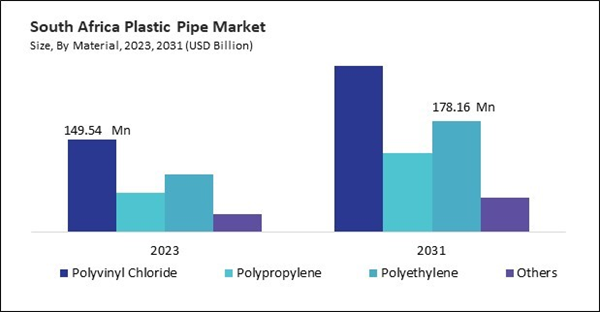In the plastic pipe market, pipes serve a critical role in water supply systems, delivering clean and safe drinking water to homes, businesses, and communities worldwide. Materials like polyvinyl chloride (PVC), polyethylene (PE), and cross-linked polyethylene (PEX) are commonly used in water supply piping due to their durability, corrosion resistance, and suitability for potable water applications. Therefore, the Brazil market consumed 280.55 kilo tonnes of these pipes for Water Supply applications in 2023.
The Brazil market dominated the LAMEA Plastic Pipe Market by Country in 2023, and would continue to be a dominant market till 2031; thereby, achieving a market value of $2,004 million by 2031. The Argentina market is showcasing a CAGR of 9.1% during (2024 - 2031). Additionally, The UAE market would register a CAGR of 7.6% during (2024 - 2031).
The market is subject to several trends that shape its growth, innovation, and adaptation to changing market dynamics. Understanding these trends is crucial for stakeholders to stay competitive and capitalize on emerging opportunities. Additionally, efforts to improve Polyvinyl chloride pipes recyclability and end-of-life management are gaining traction, aligning with circular economy principles and sustainability goals.
Aging infrastructure and deteriorating piping systems in various sectors, including water supply, wastewater, and utilities, drive the demand for pipe rehabilitation and replacement projects. Polyvinyl chloride pipes offer cost-effective solutions for infrastructure renewal, as they can be installed using trenchless methods, such as pipe bursting and pipe relining, minimizing disruption to communities and reducing construction costs.
the expansion of the oil sector in Saudi Arabia translates into a higher demand for pipes. According to the ITA, Saudi Arabia is one of the world’s top exporters of petroleum products and holds around 17% of the world’s proven petroleum reserves. The world’s second-largest proven oil reserves are found in Saudi Arabia. In 2022, Aramco’s average hydrocarbon production was 13.6 mmbpd (million barrels per day), including 11.5 mmbpd of crude oil. Saudi Aramco boasts that it produces the lowest-carbon barrel of oil in the industry and has committed to achieve net-zero emissions by 2050, outstripping the government’s 2060 net-zero target. In conclusion, the growing regional oil sector drives the market’s growth.
Based on Application, the market is segmented into Water Supply, Irrigation, Sewerage, Plumbing, HVAC, and Others. Based on End-use, the market is segmented into Building & Construction, Agriculture, Oil & Gas, and Others. Based on Material, the market is segmented into Polyvinyl Chloride, Polypropylene, Polyethylene, and Others. Based on countries, the market is segmented into Brazil, Argentina, UAE, Saudi Arabia, South Africa, Nigeria, and Rest of LAMEA.
List of Key Companies Profiled
- Chevron Phillips Chemical Company LLC
- Astral Limited
- Kubota ChemiX Co., Ltd. (KUBOTA Corporation)
- Kotec Corporation
- Tommur Industry Shanghai Co., Ltd.
- Wienerberger AG
- Aliaxis Group SA
- Finolex Industries Limited
- Geberit AG
- Georg Fischer Ltd.
Market Report Segmentation
By Application (Volume, Kilo Tonnes, USD Billion, 2020-2031)- Water Supply
- Irrigation
- Sewerage
- Plumbing
- HVAC
- Others
- Building & Construction
- Agriculture
- Oil & Gas
- Others
- Polyvinyl Chloride
- Polypropylene
- Polyethylene
- Others
- Brazil
- Argentina
- UAE
- Saudi Arabia
- South Africa
- Nigeria
- Rest of LAMEA
Table of Contents
Companies Mentioned
- Chevron Phillips Chemical Company LLC
- Astral Limited
- Kubota ChemiX Co., Ltd. (KUBOTA Corporation)
- Kotec Corporation
- Tommur Industry Shanghai Co., Ltd.
- Wienerberger AG
- Aliaxis Group SA
- Finolex Industries Limited
- Geberit AG
- Georg Fischer Ltd.









